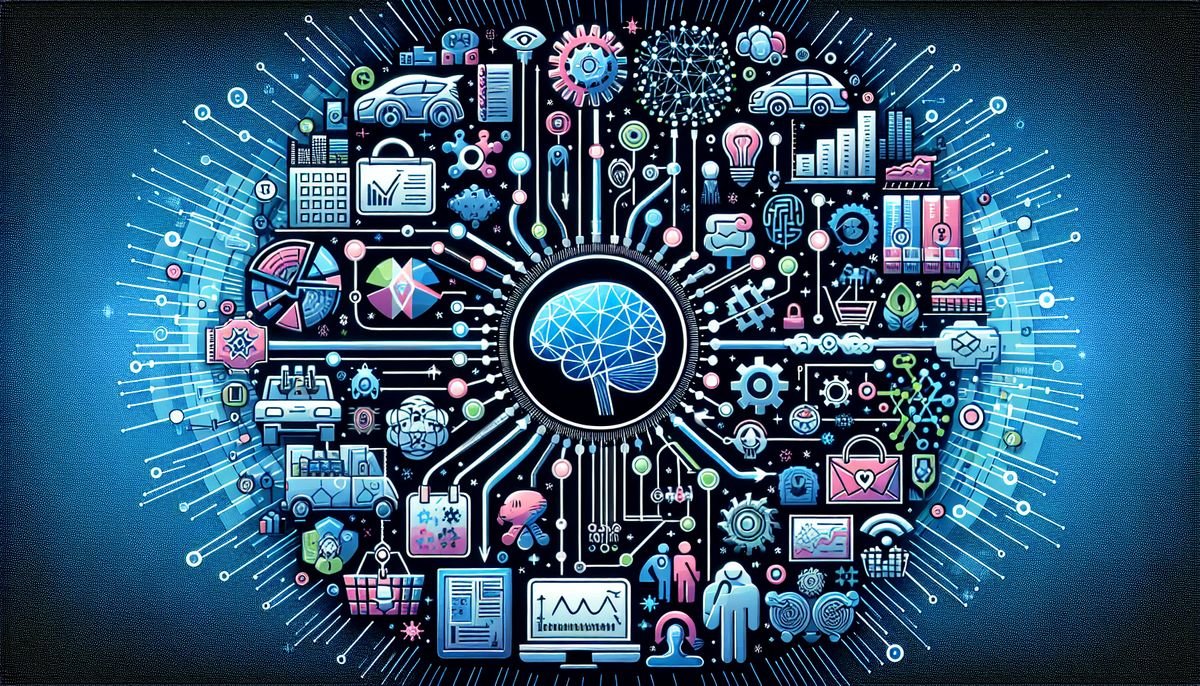In the rapidly evolving landscape of technology, machine learning frameworks are at the forefront of a data-driven revolution, transforming the way industries operate and innovate. This article delves into the latest advancements in artificial intelligence, particularly focusing on how cutting-edge machine learning frameworks are revolutionizing data analysis and propelling industries into a new era of efficiency and creativity.
Key Takeaways
- Cutting-edge machine learning frameworks are enabling industries to harness the power of generative AI, significantly impacting creative fields such as design, music, and interactive media.
- The integration of AI in data analysis is advancing precision medicine by improving diagnostic accuracy, personalizing treatments, and accelerating the drug discovery process.
- By leveraging the latest trends in AI and machine learning, businesses can gain a competitive edge through enhanced product development, market trend analysis, and operational efficiency.
Harnessing the Power of Generative AI for Creative Industries
Revolutionizing Design and Visual Arts
The intersection of artificial intelligence and creativity has given rise to a new era in design and visual arts. AI algorithms, fueled by machine learning and neural networks, are designed to analyze vast datasets, recognize patterns, and generate outputs that emulate human creativity. This technological leap is not just a novelty; it’s a tool that artists and designers are using to push the boundaries of their work.
In the realm of graphic design, the emergence of AI-generated art is a testament to the transformative power of these technologies. Designers are now able to harness the power of AI to create complex and intricate designs that were once impossible or too time-consuming to achieve by traditional means. The benefits of AI in graphic design include:
- Enhanced efficiency in generating design variations
- The ability to quickly adapt designs to different contexts
- A new avenue for creative expression
The integration of AI into the creative process is revolutionizing the way we think about art and design, opening up new possibilities for innovation and experimentation.
As we continue to explore the capabilities of AI in the creative industries, it’s clear that the potential for growth and innovation is immense. The entertainment industry, for instance, is already seeing the impact of deep learning algorithms in content creation, recommendation systems, and immersive experiences, which are streamlining production processes and enhancing creativity.
Transforming Music and Sound Production
The intersection of AI and music has led to groundbreaking developments in sound production. Magenta, an open-source project by Google, exemplifies this by providing tools that leverage machine learning to create new music and sound effects. This platform has become a cornerstone for artists and producers seeking to infuse innovation into their work.
AI’s role in music extends beyond creation to emulation. Recent tools can now mimic the voices of famous singers, generating entire songs that blur the line between human and machine creativity. While this technological leap offers exciting possibilities, it also raises concerns about copyright violations and the potential impact on the livelihoods of musicians.
The use of AI in music production is not just about innovation; it’s a balancing act between embracing new possibilities and respecting the rights and contributions of artists.
The following list highlights some of the key benefits and challenges brought by AI in music and sound production:
- Enhanced creative possibilities with AI-generated content
- Ability to emulate iconic voices and sounds
- Streamlining the music production process
- Concerns over copyright and job security for artists
Innovating in Film and Interactive Media
The film and interactive media sectors are witnessing a significant transformation, thanks to the advent of Generative AI. This technology is not only enhancing the visual effects and animation in movies but also reshaping the way stories are told. For instance, AI-driven algorithms are now capable of generating realistic digital characters, thus reducing the reliance on physical actors and potentially altering the casting process.
Generative AI is also playing a pivotal role in interactive media, particularly in video games and virtual reality experiences. By creating dynamic and responsive environments, AI is enabling a more immersive and personalized user experience. Here are some ways AI is impacting these industries:
- Streamlining video editing and visual effects generation
- Enabling more sophisticated animation techniques
- Personalizing content for individual viewers
- Facilitating the creation of complex, interactive storylines
While the opportunities are vast, there are also challenges that come with the integration of Generative AI in the movie industry. It raises questions about the originality of content and the future of human creativity in filmmaking. As the technology continues to evolve, the industry must navigate these waters carefully to harness its full potential without compromising artistic integrity.
Advancing Precision Medicine with AI-Enhanced Data Analysis
Improving Diagnostic Accuracy with Deep Learning
The integration of deep learning in healthcare is a game-changer, particularly in the realm of medical diagnostics. Deep learning-aided decision support systems are now enhancing the accuracy of skin disease diagnoses, as evidenced by a recent study. These systems analyze medical images with a precision that surpasses traditional methods, leading to more reliable and swift identification of conditions.
Deep learning algorithms have the capacity to sift through extensive datasets, such as MRI scans and X-rays, identifying patterns and anomalies that may elude the human eye. This capability is not only improving diagnostic accuracy but also supporting radiologists in making more informed decisions. The impact of these advancements is profound, with the potential to revolutionize patient outcomes by enabling earlier and more accurate detection of diseases.
The promise of deep learning in healthcare extends beyond diagnostics. It is also propelling forward the drug discovery process, predicting patient outcomes, and facilitating personalized treatment plans. This multifaceted approach is setting the stage for a new era in precision medicine.
The table below illustrates the improvements in diagnostic accuracy for skin diseases with the aid of deep learning algorithms:
| Metric | Before Deep Learning | With Deep Learning |
|---|---|---|
| Accuracy | 85% | 93% |
| Speed | 30 min | 10 min |
| Reliability | High | Very High |
Personalizing Treatment Through Predictive Analytics
The advent of machine learning in healthcare has ushered in a new era of personalized medicine, where predictive models are used to tailor treatment plans to individual patients. These models analyze vast datasets from previous cases, identifying patterns and correlations that can inform more effective and personalized treatment options. However, a recent study has highlighted a critical challenge: predictive algorithms may have limited effectiveness and struggle to generalize across diverse populations.
In the realm of predictive analytics, the precision in disease prediction is becoming increasingly remarkable. This advancement holds the promise of transforming healthcare delivery by enabling treatments that are finely tuned to each patient’s unique genetic makeup and lifestyle factors. Yet, the journey towards fully personalized medicine is complex and requires continuous refinement of predictive models to ensure they are inclusive and equitable.
The integration of predictive analytics in healthcare is not just about technology; it’s about reshaping the patient experience. By anticipating needs and customizing care, we move closer to a future where every patient receives the optimal treatment pathway.
While predictive analytics is revolutionizing various sectors, its impact on healthcare is particularly profound. Here’s how it’s enhancing the patient experience:
- Predicting diseases with unprecedented accuracy.
- Tailoring treatment plans based on individual patient data.
- Accelerating drug discovery and development processes.
- Improving overall healthcare quality and outcomes.
Accelerating Drug Discovery with AI Algorithms
The landscape of drug discovery is undergoing a seismic shift thanks to the integration of artificial intelligence. AI is streamlining the drug development process, from initial screening to predictive analytics, thereby reducing the time and cost of bringing new drugs to market. A recent trend in this domain is the use of deep learning to analyze molecular structures, which has significantly accelerated the identification of potential new medications.
One of the key benefits of AI in drug discovery is its ability to learn from vast datasets. By examining previous cases, AI can suggest treatment options that are personalized and tailored, marking a leap towards precision medicine. Moreover, AI’s predictive capabilities are not just limited to patient outcomes but also extend to identifying individuals at risk of certain diseases, allowing for proactive interventions.
The following points highlight the transformative impact of AI on drug discovery:
- Enhancing the accuracy of molecular analysis
- Predicting drug interactions and patient outcomes
- Personalizing medicine with tailored treatment plans
- Reducing the overall time and cost of drug development
The integration of AI into drug discovery is not just a technological advancement; it’s a paradigm shift that promises to modernize healthcare and improve patient care on a global scale.
Conclusion
In summary, the latest machine learning frameworks are not just technological advancements; they are catalysts for industry-wide transformation. By harnessing the power of deep learning and AI-driven analytics, businesses across healthcare, finance, automotive, and entertainment are experiencing a renaissance in innovation and efficiency. These tools enable the analysis of vast datasets, uncovering insights that drive smarter decision-making and create a competitive edge. As we continue to witness the integration of these frameworks into various sectors, their potential to revolutionize operations and product development is boundless. The future of industry lies in the intelligent application of these groundbreaking technologies, promising an era of unprecedented growth and discovery.
Frequently Asked Questions
How is generative AI impacting the creative industries?
Generative AI is transforming creative industries by enabling new forms of design, visual arts, music, and media production. It assists artists in generating unique pieces, supports designers in creating innovative patterns, and aids filmmakers and game developers in crafting immersive environments, thereby enhancing creativity and efficiency.
What role does AI-enhanced data analysis play in precision medicine?
In precision medicine, AI-enhanced data analysis plays a crucial role by improving diagnostic accuracy, personalizing treatment plans based on predictive analytics, and accelerating drug discovery processes. It allows for more precise targeting of therapies to individual patient profiles, leading to better health outcomes.
What are some of the latest machine learning frameworks revolutionizing industries?
Recent machine learning frameworks like TensorFlow, PyTorch, and Keras are revolutionizing industries by providing powerful tools for building and deploying AI models. These frameworks facilitate the development of deep learning algorithms that can analyze vast datasets, improve decision-making, and drive innovation across various sectors.



